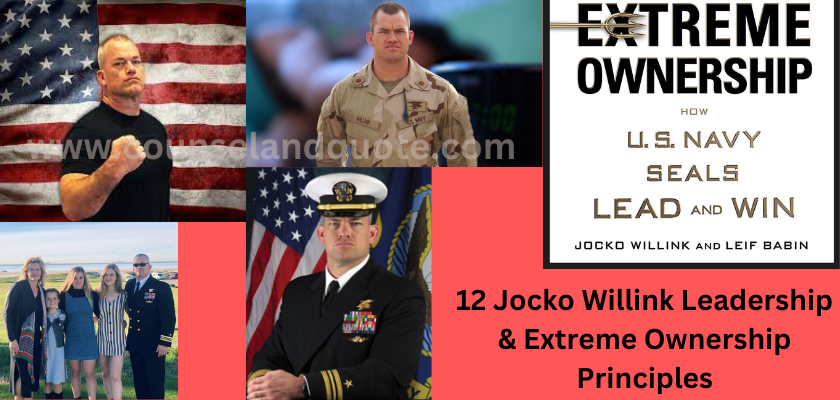Jocko Willink Leadership & Extreme ownership principles make you successful and systematic in life. It makes any mission successful.
The application of Jocko Willink Leadership Principles is tested in the harsh conditions of the Iraq and Afghanistan wars. They not only made the mission successful but also motivated the soldiers for their purpose and role.
Extreme Ownership: How U.S. Navy SEALs Lead and Win- Book By Jocko Willink
Extreme Ownership: How U.S. Navy SEALs Lead and Win- Book By Jocko Willink

These 12 Jocko Willink Ownership Principles are given in his book “Extreme Ownership: How U.S. Navy SEALs Lead and Win.”
He has co-authored the book with his friend Leif Babin.
Jocko Willink is a former US Navy SEAL and leadership consultant. Off late, he has worked extensively on leadership and developed a set of principles.
Jocko Willink Leadership & Extreme Ownership Principles
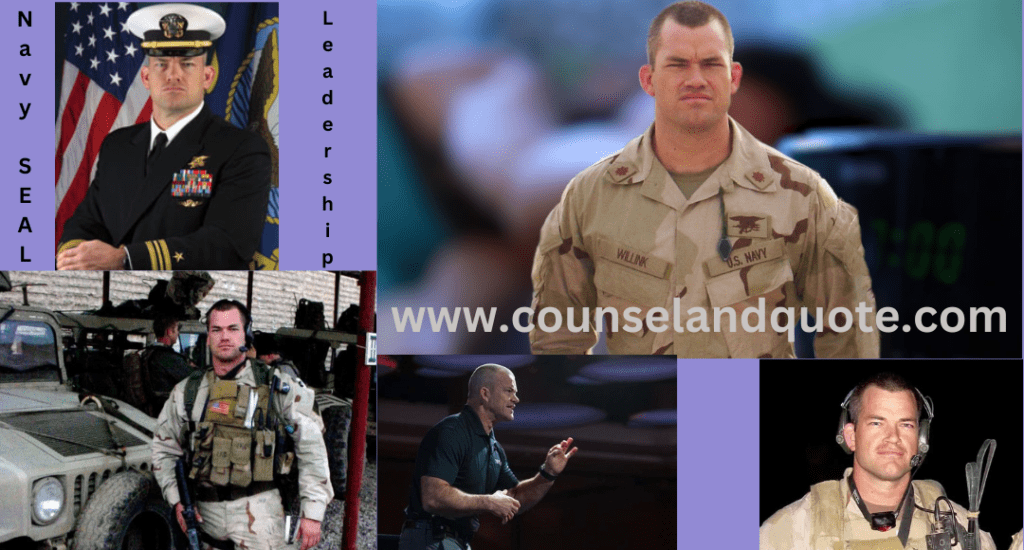
His leadership principles are based on his experiences in the military and business.
These principles are known as the 12 Leadership and Extreme Ownership Principles.
These rules are a guide for anyone seeking to improve their leadership skills and become a more effective leader.
In this article, we will explore each of the 12 principles in detail and provide examples of how they can be applied in different testing conditions.
Principle- 1 Extreme Ownership
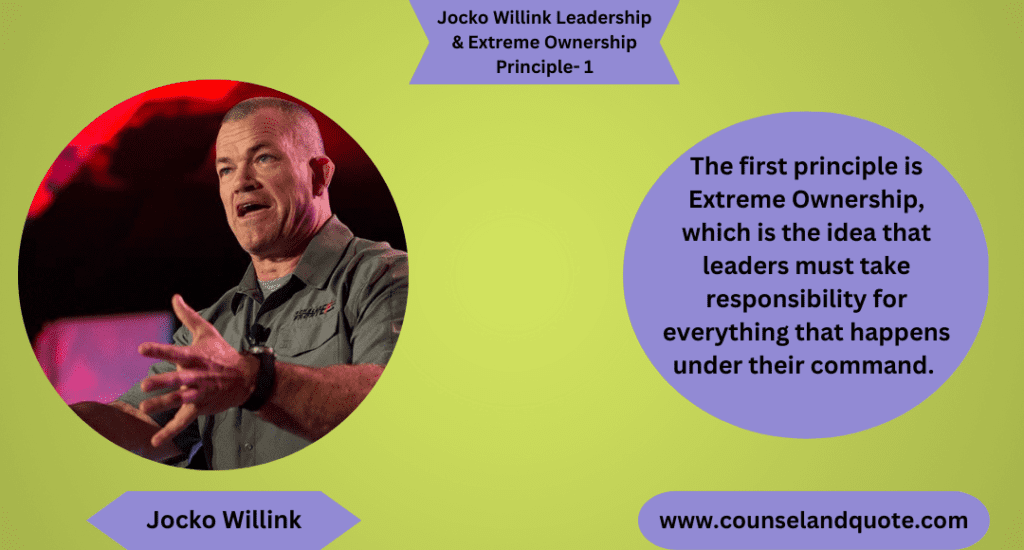
- The first principle is Extreme Ownership, which is the idea that leaders must take responsibility for everything that happens under their command.
- This means owning not just your actions, but also those of your team. The performance of the team represents leadership quality and style.
- Jocko argues that the best leaders are those who take full responsibility for their decisions and actions, even when things go wrong.
- Extreme Ownership Principle In Action- One example of this principle in action is the story of Lieutenant Commander Rorke Denver, who was serving as the leader of a SEAL team in Afghanistan.
- During a mission, one of Denver’s team members accidentally shot and killed an Afghan civilian. Denver took full responsibility for the incident and met with the family of the victim to apologize on behalf of his team.
- This act of Extreme Ownership helped to diffuse the situation and maintain good relations with the local population.
Principle- 2 No Bad Teams, Only Bad Leaders

- The second principle is No Bad Teams, Only Bad Leaders. This principle is based on the idea that any team can be successful if it has a strong leader who is willing to take responsibility for its success or failure.
- This means that it is the leader’s responsibility to train, mentor, and motivate their team members to perform at their best.
- No Bad Teams, Only Bad Leaders Principle in action– An example of this principle in action is the story of a new SEAL team that Jocko was assigned to lead. When Jocko arrived, the team was struggling and had a reputation for being undisciplined.
- However, instead of blaming the team for its failures, Jocko took responsibility for their performance and began to train and mentor them.
- Within a few months, the team had transformed into one of the most successful SEAL teams in the country.
Principle- 3 Believe

- The third principle is Believe. It is the idea that leaders must have confidence in themselves and their teams to be successful.
- This means believing that you can achieve your goals and that your team can overcome any obstacle.
- Believe principle in action– An example of this principle in action is the story of the Battle of Ramadi.
- It was one of the most intense and prolonged battles of the Iraq War.
- Jocko and his team were tasked with securing the city and rooting out insurgents. It was a mission that many people believed was impossible.
- However, Jocko and his team believed in their training and their ability to accomplish their mission, and they ultimately succeeded in securing the city.
Principle- 4 Check Your Ego

- The fourth principle is to Check Your Ego. This extreme ownership principle gives us the idea that leaders must be willing to put their egos aside and prioritize the needs of their team.
- This means being humble and willing to listen to feedback from others, even if it is critical or uncomfortable.
- Check your Ego Principle in action- An example of this principle in action is the story of a SEAL team that Jocko was serving on in Iraq.
- During a mission, Jocko made a mistake that put his team in danger.
- After the mission, his team members gave him critical feedback about his leadership, which he took to heart and used to improve his performance.
Principle- 5 Cover and Move

- Jocko Willink’s principle of “Cover and Move” is a military tactic that emphasizes teamwork, communication, and coordinated action to achieve a common goal.
- The principle is based on the idea that success in a mission depends on two main elements- covering fire and moving.
- In this principle, one team provides cover while the other team moves forward. The roles are then reversed until the mission is completed.
- Cover and Move principle in action– Here is an example of how Jocko Willink has applied the “Cover and Move” principle in a real-world scenario.
- Willink was leading a group of Navy SEALs on a mission to capture a high-value target. The team had to move across a large open field, which was exposed to enemy fire.
- Willink divided his team into two groups. One team would provide cover fire while the other team moved forward, and then they would switch roles.
- During the operation, Willink’s team encountered heavy enemy fire. To counter the enemy fire, Willink’s team provided covering fire while the other team moved forward.
- As they reached a position of relative safety, they switched roles, with the first team providing cover while the second team advanced.
- The “Cover and Move” principle allowed the team to move forward safely while minimizing the risk of casualties. It also allowed them to maintain communication and coordination throughout the operation, which was critical to their success.
- Jocko Willink’s principle of “Cover and Move” emphasizes the importance of teamwork, communication, and coordinated action to achieve a common goal.
- By dividing a team into two groups and assigning different roles, the team can move forward safely and efficiently while minimizing the risk of casualties.
- This principle can be applied in various scenarios, including military operations, business, and personal life.
Principle- 6 Keep It Simple

- Keep It Simple is based on the idea that complexity can be confusing, time-consuming, and counterproductive.
- The principle encourages people to keep things as simple as possible to reduce confusion, minimize errors, and increase efficiency.
- Keep it Simple Principle in action– One of Willink’s examples of the importance of keeping things simple comes from his time as a Navy SEAL leader.
- During a mission, his team was tasked with taking out an enemy target in a building.
- The team had a complex plan with multiple steps and contingencies. However, when they entered the building, they found that the target had moved to a different location, and the plan fell apart.
- In the chaos of the situation, Willink realized that the team needed to simplify their approach.
- He immediately called for a “default plan,” which was simply to clear each floor of the building one at a time until they found the target.
- This simple plan allowed the team to regroup, regain control, and complete the mission successfully.
- Willink’s example demonstrates the importance of keeping things simple, especially in high-stress situations where time is limited and mistakes can be costly.
- By simplifying the plan, the team was able to focus on the task at hand, minimize confusion and increase their chances of success.
- Overall, Jocko Willink’s principle of “Keep It Simple” encourages individuals and teams to simplify their approach to tasks and challenges to increase efficiency, reduce confusion, and minimize errors.
Principle- 7 Prioritise and Execute

- Jocko Willink’s principle of “Prioritize and Execute” is a simple yet effective approach to getting things done.
- The idea behind this principle is to focus on the most important tasks and execute them first, rather than trying to do everything at once and ending up accomplishing nothing.
- Prioritise and Execute principle in action– To illustrate this principle, Jocko Willink often shares a personal example from his time as a Navy SEAL commander.
- One night, he was leading a team on a mission to capture a high-value target. The team had a detailed plan in place, but as soon as they landed on the target, things started to go wrong.
- The first problem was that the team’s radios weren’t working, which meant they couldn’t communicate with each other.
- Then, they discovered that the target wasn’t where they expected it to be, which threw their plan into disarray. To make matters worse, they were under heavy fire from enemy fighters.
- In the face of all these challenges, Jocko Willink knew that he had to prioritize and execute. He quickly assessed the situation and identified the most critical tasks that needed to be done.
- The priority was to establish communication between the team members, so they could coordinate their movements and respond to threats effectively.
- To achieve this, Jocko ordered one of his team members to climb to the top of a nearby hill and act as a radio relay.
- This allowed the team to establish communication and start working together more effectively.
- Once this was done, they were able to move towards the target and engage the enemy forces.
- Throughout the rest of the mission, Jocko continued to prioritize and execute.
- He identified the most critical tasks and made sure that they were executed first.
- This allowed his team to overcome the challenges they faced and complete the mission successfully.
- Jocko Willink’s example illustrates the importance of prioritizing tasks and executing them in order of importance.
- By focusing on the most critical tasks, we can achieve our goals even in the face of difficult and unexpected challenges.
Principle- 8- Decentralized Command
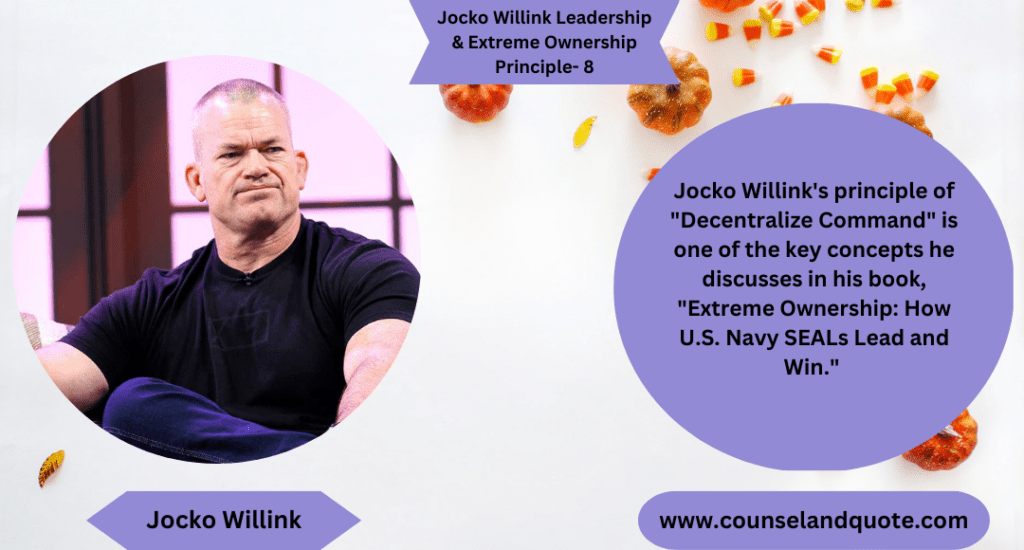
- Jocko Willink’s principle of “Decentralize Command” is one of the key concepts he discusses in his book, “Extreme Ownership: How U.S. Navy SEALs Lead and Win.”
- This principle emphasizes the importance of delegating decision-making authority to frontline leaders and empowering them to take action without micromanagement from higher-ups.
- The idea behind decentralizing command is that it allows for more efficient decision-making and action on the ground.
- When leaders at every level of an organization are empowered to make decisions and take action, they can respond more quickly to changing circumstances and adapt to new challenges.
- This approach also frees up senior leaders to focus on strategic planning and other high-level tasks.
- Jocko Willink served as the commander of Task Unit Bruiser during the Battle of Ramadi in Iraq.
- During this time, he implemented the principle of decentralizing command with great success.
- Decentralized Command principle in action– He describes an incident in which a sniper team under his command came under heavy fire from an enemy machine gun position.
- Rather than waiting for orders from higher-ups, the team leader immediately called in support from an adjacent unit and took the fight to the enemy, neutralizing the machine gun and securing the area.
- This example illustrates the effectiveness of decentralizing command.
- The sniper team leader had the authority and training to make quick decisions and take decisive action when the situation called for it.
- By empowering frontline leaders like this, Jocko was able to create a culture of trust and initiative within his unit. He trusted his leaders to make the right decisions, and they in turn felt valued and motivated to perform at their best.
- Jocko Willink’s principle of decentralizing command emphasizes the importance of empowering frontline leaders to make decisions and take action without micromanagement from higher-ups.
- By doing so, organizations can respond more quickly to changing circumstances, adapt to new challenges, and create a culture of trust and initiative among their leaders.
Principle- 9 Plan

- Jocko Willink’s Principle 9 is “Plan,” and it emphasizes the importance of achieving success through planning.
- Plan principle in action– Here’s an example of how Jocko Willink uses planning to achieve his goals:
- One of his goals is to write a new book on leadership that will be even more successful than his previous books. Here’s how he plans to achieve that goal:
- Clearly define the goal: Jocko’s goal is to write a new book on leadership that will be even more successful than his previous books.
- Break the goal down into smaller, more manageable tasks: Jocko breaks the goal down into several smaller tasks, including researching the topic, outlining the book, writing the first draft, editing the draft, and publishing the book.
- Set a timeline: Jocko sets a timeline for each of these tasks, with specific deadlines for each one. For example, he might set a deadline of three months for researching the topic, two months for outlining the book, six months for writing the first draft, and so on.
- Anticipate potential obstacles: Jocko thinks about potential obstacles that might get in the way of achieving his goals, such as writer’s block or unexpected life events. He plans for these obstacles by building in extra time in his timeline and developing strategies for overcoming them.
- Take action: With his plan in place, Jocko takes action by following his timeline and working on each task diligently. He also regularly evaluates his progress and adjusts his plan as necessary.
- By planning in detail and following through on his plan, Jocko can achieve his goal of writing a successful book on leadership.
- This principle can be applied to any goal, whether personal or professional, to increase the likelihood of success.
Principle- 10 Leading Up & Down The Change Of Command
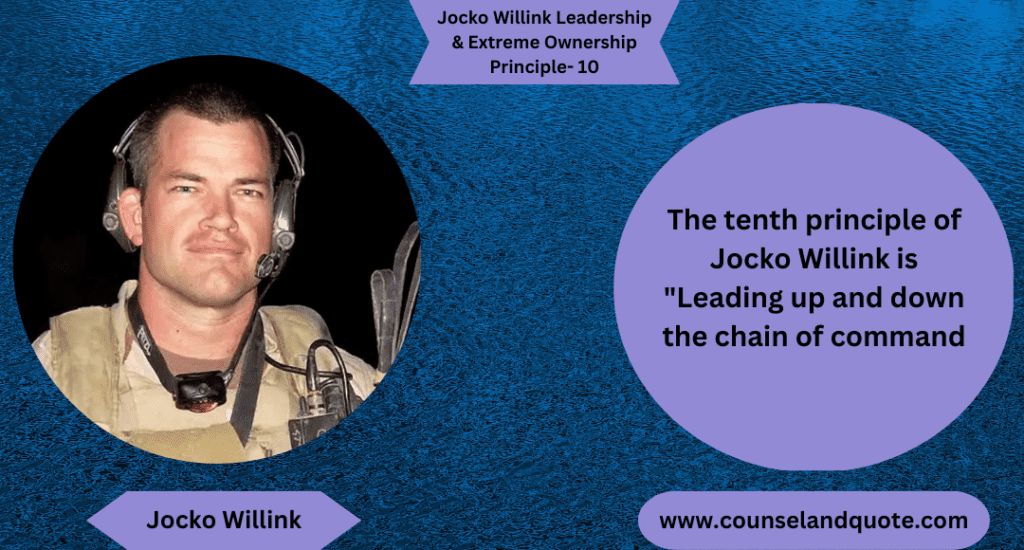
- The tenth principle of Jocko Willink is “Leading up and down the chain of command.”
- According to Willink, leaders at all levels must not only lead their subordinates but also lead their superiors.
- Leaders must understand the objectives of their superiors, and they must work to align their objectives with those of their superiors to achieve overall organizational goals.
- Willink explains that leading up the chain of command involves communicating effectively with higher-ups, providing candid feedback, and proposing solutions to problems.
- Leaders must have the courage to respectfully challenge their superiors when necessary, but they must also be willing to accept and execute decisions made by their superiors.
- Leading down the chain of command, on the other hand, involves developing and empowering subordinates, setting clear expectations, providing feedback, and ensuring that tasks are executed to the best of the team’s ability.
- Leaders must inspire their subordinates to take ownership of their responsibilities and provide them with the necessary resources to succeed.
- “Leading up and down the chain of command” principle in action– An example of this principle in action can be seen in Willink’s experience as a SEAL platoon commander in Iraq.
- During one mission, his platoon was tasked with securing a building but faced heavy enemy fire. Willink’s superior officer instructed him to hold his position and wait for backup, but Willink recognized that his platoon was in danger of being overrun and decided to take action.
- He communicated his decision to his superior and then led his platoon in an assault on the building, successfully neutralizing the enemy threat.
- Willink’s decision to take action despite his superior’s instructions was a clear example of leading up the chain of command. He recognized the need to deviate from the plan and took responsibility for the decision.
Principle- 11 Decisiveness Amid Uncertainty

- Jocko Willink’s Principle 11 is “Decisiveness amid uncertainty,” which refers to the ability to make quick and effective decisions in the face of incomplete or uncertain information.
- This principle is particularly important in high-stakes situations where a delay in decision-making could have serious consequences.
- To illustrate this principle, Jocko Willink often refers to his experience as a Navy SEAL commander in Iraq.
- Decisiveness Amid Uncertainty principle in action– In one instance, his team was tasked with securing a key bridge in the city of Ramadi.
- As they approached the bridge, they came under heavy fire from enemy fighters, and Willink realized that the situation was more complex and dangerous than he had initially anticipated.
- Despite the uncertainty and chaos of the situation, Willink knew that he needed to make a quick decision to protect his team and complete the mission.
- He quickly assessed the situation and realized that his team’s current position was untenable, so he decided to withdraw to a safer location.
- This decision was not without risks, as it required exposing his team to even more enemy fire as they retreated.
- However, Willink recognized that it was the best course of action given the limited information and resources available to him.
- Willink’s decisive action allowed his team to regroup and come up with a new plan to secure the bridge. They were ultimately successful in their mission, but it was Willink’s quick and decisive action in the face of uncertainty that helped to ensure their success.
- The lesson from this example is that in high-stress and uncertain situations, leaders must be able to make quick and effective decisions based on limited information.
- They must be willing to take calculated risks and accept the potential consequences of their actions.
Principle- 12 Disciplines Equals Freedom- The Dichotomy Of Leadership

- Jocko Willink explains that discipline is the key to unlocking one’s full potential and achieving freedom in all aspects of life.
- According to Willink, discipline is the ability to do what needs to be done, even when you don’t feel like doing it.
- It means following through on your commitments, sticking to your goals, and working hard to achieve them.
- Discipline is not a punishment, but a choice that leads to freedom.
- The principle of “Discipline Equals Freedom” means that when you are disciplined in your actions and behaviours, you can achieve greater freedom in your life.
- This is because discipline allows you to control your impulses and make conscious decisions that align with your goals and values.
- Disciplines Equal Freedom- The Dichotomy Of Leadership principle in action– Willink’s example of this principle comes from his time as a Navy SEAL. He explains that the most successful SEAL teams were those that were highly disciplined in their training and execution of missions.
- They followed strict protocols and standard operating procedures, which allowed them to operate effectively in high-stress environments.
- On the other hand, he also witnessed teams that lacked discipline, and as a result, they struggled to accomplish their objectives.
- They were disorganized, made poor decisions, and often failed to complete their missions.
- Willink emphasizes that discipline is not just important for military operations but also in everyday life.
- Whether it’s sticking to a fitness routine, following a budget, or working towards career goals, discipline is essential for achieving success and freedom.
Conclusion
Jocko Willink’s 12 principles are detailed and exemplified here.
By embracing principles and disciplines in all aspects of your life, you can unlock your full potential and create a more fulfilling and successful future for yourself.
You can accomplish any goal and mission in life. Your success and glory depend on the kind of choices you make in your life. Your team’s success depends on the decisions and commitments you make for your team.
Please share the post with your friends and relatives. Jocko Willink and his principles have the potential to cross all hurdles. It can bring a positive change in their life.
May God bless you. Amen.
Thank You.
